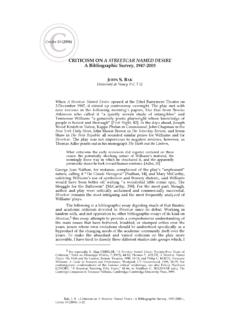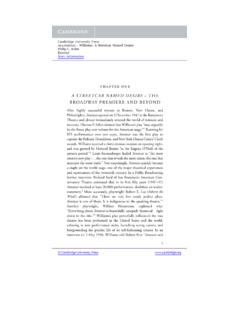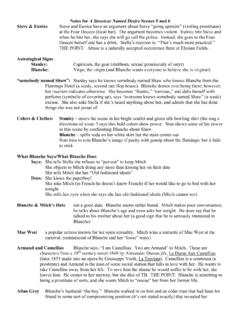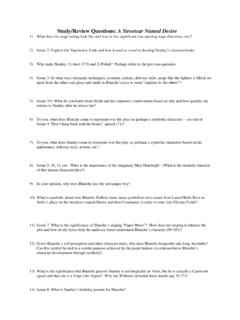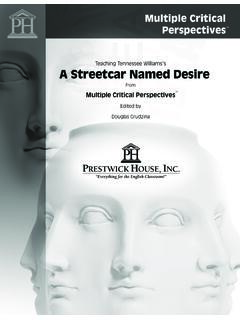Transcription of TRUTH AND ILLUSION IN TENNESSEE WILLIAMS’ …
1 English Studies at NBU, 2016 pISSN 2367-5705, eISSN 2367-8704 Vol. 2, Issue 1, pp. 31-41 31 TRUTH AND ILLUSION IN TENNESSEE WILLIAMS A streetcar named desire Andrea Gencheva New Bulgarian University, Sofia, Bulgaria Abstract The following paper discusses some of the motifs ubiquitous to TENNESSEE Williams oeuvre, namely TRUTH and ILLUSION as they are presented in one of his most famous plays, A streetcar named desire . The author endeavors to portray these motifs through an analysis of the characters behavior and the subsequent, tragic consequences in order to reveal the humanness of Williams characters who are just like the playwright himself, all marred by alcoholism, depression and loneliness. Keywords: A streetcar named desire , Blanche DuBois, TRUTH , ILLUSION , psychological breakdown Article history: Received: 13 October 2015; Reviewed: 29 November 2015; Accepted: 15 May 2016; Published: 20 August 2016 Andrea Gencheva, MA in English Literature (University of Novi Sad, Serbia), is a Lecturer in the English language with the Department of English Studies, New Bulgarian University (Bulgaria).
2 She is also a freelance writer and editor of articles, short stories, and novellas. Her research interests include literature, foreign language teaching, writing and translation from English, Spanish, Hungarian, and Serbian. Email: Andrea Gencheva 32 TENNESSEE Williams early success is largely based on the strength of his unforgettable female leads, such as the southern belles of The Glass Menagerie and A streetcar named desire , who are strong, articulate and assertive, yet often tender and vulnerable (Hovis, 2003). Cruelly extracted from the only context that gives her life meaning, Blanche DuBois becomes a victim, while simultaneously fighting for survival, as the obsolete and old-fashioned values that she adheres to fade away.
3 The brutality and harsh reality characterizing the social milieu of the 20th century do not allow for her gender consciousness to evolve, creating a final and tragic inability to distinguish the TRUTH from illusions she exploits to provide refuge for herself. The very beginning of the play mars Blanche as a scarlet-lettered woman, a recognizable and uninvited outcast, whose indiscrete sexual behavior distorts her image of a teacher as a [custodian] of culture (Bartlett & Cambor, 1974). She endeavors to maintain a mental equilibrium, pirouetting on a wire, balancing her own personal interpretations of masculinity and femininity, superiority and inferiority, supremacy and subordination. What is revealed about her, in scene seven of the play, is crucial information uttered by her sister.
4 You ve got to realize that Blanche and I grew up under very different circumstances than you did (Williams, 2000, p. 209). It is exactly this crucial information about her belonging to a defunct social stratum of nobility that will be her downfall. She is portrayed as the epitome of a Southern belle, a social phenomenon rooted in the idea that women might escape the rule of the patriarchy that the oppositions of white/black, master/slave, lady/whore, even male/female might collapse into an anarchic conflagration threatening to bring down the symbolic order (Roberts, 1994, p. xii). Being instructed that her essential trait is her physical beauty, she finds herself lost in a state of perpetual panic about her fading looks.
5 Needing a physical touch, yet conditioned by Southern Puritanism to control and subdue, preferably eradicate, her libidinal desires, her coquettishly prim mannerisms do not fool anyone into believing her virginal. Thus, it becomes evident that the only temporal stage where her haunting obsessions are victorious over reality is the past, which she desperately and unsuccessfully tries to hold on to. Blanche was conditioned by a childhood of wealth, money and constant tending of her every whim. She was a Victorian model of the pure and chaste angel of the house, and her entire behavior exuded antebellum chivalry code, fortifying the already TRUTH AND ILLUSION IN TENNESSEE WILLIAMS A streetcar .. 33 ubiquitous and potent stereotype. Taught that a cultivated woman, a woman of intelligence and breeding, can enrich a man s life immeasurably (Williams, 2000, p.)
6 211), she perceives her sole purpose in life an almost legal commitment to courtship, girly romances and finally, marriage to a rich and always older, wealthy male member of the Southern gentry, and if she was pretty and charming and thus could participate in the process of husband-getting, so much the better (Seidel, 1985, p. 6). This idea calls to attention the duplicity of Blanche s behavior with Mitch. Having been forced to adopt the socio-cultural role of asexual maternity, Blanche is aware that her time is ticking away. Tradition states that the heyday of the belle is short-lived; from a debut at sixteen or seventeen to the threat of spinsterhood by nineteen, her career lasts for the few short years in between (Seidel, 1985, pg. 61). Someone as complex and perceptive as Blanche would likely not be interested in someone as dull and simple as Mitch, at least not for long, and that even the game she is playing with him is a lie: she wants to marry him not because she loves him, but because she wants to secure her own future (Hovis, 2003).
7 Her so called game of deception, willing and conscious, though na ve and calamitous only to herself, is merely the result of her upbringing. Thinking she would marry the first man she falls in love with and live a fairy tale life makes Blanche vulnerable to the harsh realities of life, which is why the Blanche who gets off the streetcar named desire is not the same Blanche who lived and loved in Belle Reve. Stella explains this to Stanley perfectly: You didn t know Blanche as a girl. Nobody, nobody was tender and trusting as she was. But people like you abused her, and forced her to change (Williams, 2000, p. 136). Thus, Blanche changes by developing an outer self that serves to protect her inner self from scrutiny and judgment (Hovis, 2003). Her utter unwillingness to change is evident in her words to Stella: Well, Stella you re going to reproach me, I know that you re bound to reproach me but before you do take into consideration you left!
8 I stayed and struggled! You came to New Orleans and looked out for yourself! I stayed at Belle Reve and tried to hold it together! I m not meaning this in any reproachful way, but all the burden descended on my you are the one that abandoned Belle Reve, not I! I stayed and fought for it, bled for it, almost died for it! (Williams, 2000, p. 126) The days after the Civil War had created a mythical, legendary ideal of the Old South, which inspired awe with its abundance of opulence, social order and courteous Andrea Gencheva 34 living, and Blanche is all too eager to join in. While enslaved African Americans saw the past for what it really was, the clanking chains, the Southern gentry produced sounds of clanking glasses, but this did not bother Blanche one bit.
9 On the contrary, she enjoyed all the luxury of social pride and honor a genteel, plantation owning family could afford. This was her refuge, and the eventual deterioration of this image, the disappearance of this safe economic system her world was grounded in, had a profound effect on her psyche, equaled only to her painful experience of marriage. Consequently, the repercussions of losing Belle Reve are devastating to Blanche. She finds herself in life situations she thought were far below her, while in fact, she merely follows in the footsteps of her ancestors, who lost their grand estate due to grand fornications (Williams, 2000, p. 173). While praised and revered for their gentility and refinement, her ancestors are revealed to have indulged in carnal pleasures.
10 This inability to sustain two sides within herself, will eventually lead to a vivid illustration of her utilization of sex to obliterate her conscience. While Stella removes herself from the insalubrious surroundings and allows herself to be brought down to earth by Stanley, accepting her raw sexuality and exploring it with him, Blanche cannot consign to oblivion the manner in which she was raised, and continues to inhabit delusions, tirelessly waiting for her knight in shining armor to come and take her away. While Stella s marriage unshackles and simultaneously redeems her, Blanche s first and only marital affair does the opposite. It plunges her into dark depths of self-denial, guilt, revulsion and antipathy, leading her to a sagittal path of nymphomania and prostitution.

